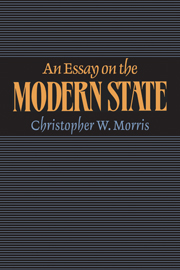3 - Social order in anarchy
Published online by Cambridge University Press: 05 June 2012
Summary
SOCIAL ORDER
One reason why it might be hard to imagine modern life without states is that we are so accustomed to the goods and services secured by governments that it is difficult to think how we would manage without states. Modern governments provide us with (or subsidize the production of) goods and services as varied as protection, food, shelter, contract enforcement, roads, sanitation, space exploration, education and job training, currency and banking systems, postal services, telecommunications, radio and television, clean air and water, unemployment compensation, transportation, health care and medicine, retirement benefits, recreation facilities, parks and forests, monuments, museums, music, and painting. In most Western states, large and increasing proportions of the population receive their incomes directly from government. What would we do in the absence of modern states?
There is now a large literature devoted to showing that many, if not most, of these goods and services can be provided relatively efficiently by “the private sector”, that is, by nongovernmental agencies and “markets”. Much of this literature is controversial, but critics now often concede the main point that most of these goods could be provided by nongovernmental means, and they challenge instead the social costs, the distributional consequences, and other ethical implications of relying thus on “free markets”. What remains controversial is whether we could do away completely with states and secure all that we need and want in anarchy.
- Type
- Chapter
- Information
- An Essay on the Modern State , pp. 56 - 101Publisher: Cambridge University PressPrint publication year: 1998



